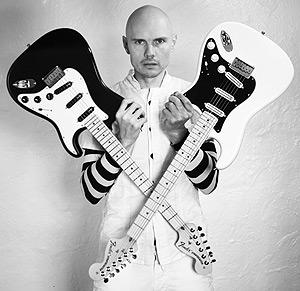Revisiting The Smashing Pumpkins' Origins
By Tankboy in Arts & Entertainment on Nov 30, 2011 8:20PM

One of the biggest myths about The Smashing Pumpkins, and it's perpetuated throughout the liner notes of the deluxe box set reissues of their first two albums Gish and Siamese Dream, is that all the cool kids hated them in their early days when they were up and coming.
This is easily discounted both by the band and this writer. An anecdote: this writer came up in the music scene roughly parallel to main Pumpkin Billy Corgan and his gang, so much so that I took them for granted and blew off an invite to the album release show for Gish to go dancing at the all ages club Medusa's at the time. My friends and i didn't blow them off because we thought The Smashing Pumpkins sucked; we blew them off because we were already huge fans and figured there would be many shows to see from the band in the future.
We were fans. Some of our crew had hand lettered demos sent via mail — THE MAIL — from Corgan himself. And all of us bought Gish and Siamese Dream the days they each came out. And there were lots of us.
People (at least in Chicago, honest to God) have loved the Smashing Pumpkins from the get-go. Even the cool kids. We weren't idiots: We knew when we were hearing something truly groundbreaking, even if the old fogey rock critics kept comparing the band to Supertramp and Styx.
Keep in mind that, as Siamese Dream was coming out, The Smashing Pumpkins were touring as the opening band for The Red Hot Chili Peppers with a little band from Seattle named Pearl jam acting as their opening act. So obviously Corgan and company were under appreciated. And even in their earliest of early days they were packing The Avalon and selling out The Metro. Under-appreciated? No.

Photo by Kristin Burns
So that's history. A reissue does not make a classic album any more classic. And if I'm writing this review for someone who is newly coming to the table of The Smashing Pumpkins then you are either four years old or beyond salvation. So what's in a reissue? In The Pumpkins' case it's the release of a bunch of demos and epic remixed version of "Starla" and the pounding "Siamese Dream," then the price of admission is fully warranted. Unlike most reissues, most of the additional material here is well worth a listen.
So now we hit a point of indulgence: You need to own these albums. You probably already do own them, but these reissues are truly a delight. Gish thunders and roars like it never did through its original mixing and mastering. Siamese Dream now sounds even larger than it did the first time we shoved it in our CD player. Usually when we hear the phrase "remaster" we cringe and assume that it merely means that a recording has been bastardized to win the volume wars, but in this case both albums sound richer with the re-treatment. We are all reminded that two decades ago pretension wasn't a dirty word and world domination through six strings was a worthwhile cause.
And maybe that's the larger lesson of these remasters. It's a reminder. A reminder that at one time we lauded bands like The Smashing Pumpkins because they were grandiose, because they reached into the beyond and because they were unafraid to let their naked ambition to be something larger shine though. Since then, we have (and this writer is included in this set of the population) crucified billy Corgan for having the gall to be so full of himself. But Gish and Siamese Dream (and even their outtakes and supposed half-baked toss-offs) offer stark proof that his tendencies, at least in the earlier days of his career, led to undeniable greatness. And, honestly, were not sure any band nowadays, or even in the years to come, will have half the balls to accomplish what Corgan's vision set out for future generations.
The Smashing Pumpkins were never underdogs. They were always royalty. And these reissues only serve to remind us of that.